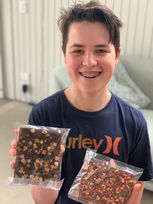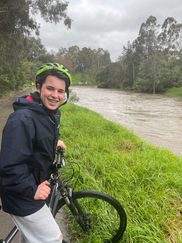
Max's Story
The Full Story
Max McKenzie
Max was awesome. He was a feisty, strong, independent, very loud kid. He didn't stop talking. He talked nonstop. And he always had an opinion about everything. And his opinion was always heard. He made sure everyone heard it, but he was also extremely kind, and he had lots of great friends. He made friends easily. And he loved life. He loved being busy. He loved everything. Max loved the next adventure and was always looking for the next adventure. He was excited about life. He was good at talking to people. He could have a conversation with anybody..
He could absolutely talk to anyone about anything. And it wasn't scared to talk to anyone. He would go up to a stranger if he thought that he could tell them something that they wanted to hear, and he had the confidence to do that. He was extremely confident. You know, he would audition for school musicals when he knew he couldn't really sing very well.

And it didn't bother him because he just wanted a role. And somehow, he always got a role that didn't involve singing or it involved something else. And he would give anything a go.
On 6 August 2021, Max was staying with his grandma as he did once a week for a long time. It was COVID lockdown number five, day one. And he went home from school that day to his grandma as planned. While staying there, he inadvertently consumed some finely ground walnuts that were in an apple crumble. Max became itchy and he started to get symptoms of asthma. His grandma immediately telephoned Tamara.
Tamara’s mum explained that Max was having an allergic reaction. She didn't know what it was to, at that stage, but explained that Max had just eaten an apple crumble. Tamara spoke to Max on the phone and reassured him that she would be there shortly. Max said that he was okay and was about to have a shower.
After Tamara arrived, she and Max agreed that Max was having a slight problem breathing so MAx gave himself the EpiPen and Tamara called 000. The ambulance arrived 7 minutes later. The paramedics asked Max some questions and he answered them coherently.
When paramedics arrived to assess Max, Max's oxygen levels were 100% and he's able to talk in sentences. He was able to tell the paramedics that his asthma was due to anaphylaxis.

At the beginning, the paramedic said, “Looks like you've got asthma, Max”, but Max was able to explain that it was anaphylaxis because it was so sudden in onset.
He was able to give his own diagnosis, which was important. Max was transferred to the ambulance and was still chatting and talking. Tamara rode in the ambulance with Max. Soon after they left the grandmother’s house, Max yelled out to Tamara that he “didn't want to die”.
The paramedics had been with Max for half an hour when Max suffered a respiratory arrest in the ambulance. Up to that time, he had undergone a linear deterioration in terms of his oxygen levels going down and his difficulty breathing going up, until he reached the point of their compensation.
As with all young people in this situation, they can cope with severe asthma until the very last moment when the fighting stops altogether. Max was able to talk right up until the point where he stopped breathing.
Max did receive two doses of intramuscular adrenaline before he had his respiratory arrest. When Max had his respiratory arrest in the back of the ambulance, a junior paramedic who'd been working for four weeks had been allocated to oxygenate Max with a bag and mask ventilation. The difficulty of doing so quickly became apparent.
An intensive care paramedic took over. One of the most difficult things to do in medicine is to bag and mask ventilate a patient with severe asthma and an undergraduate paramedic should never be put in that situation for their sake and for the patient's sake.
When Max stopped breathing and the intensive care paramedic took over his breathing for him, his heart – which had virtually slowed down to 40 beats per minute – came back up and he was given an intravenous dose of adrenaline that was almost a cardiac arrest dose.
For the subsequent 9 minutes on the way to hospital, his heart rate didn't slow and he was agitated for some of that time and trying to move, making it difficult for paramedics in the back of the ambulance. And he arrived at the emergency department onto the emergency department trolley.
Ben was at work in his retrieval job and in his retrieval uniform, and he realized that things weren't going well from the messages he was frequently receiving. He made his way to the hospital and went into the resuscitation cubicle that Max was in. Ben arrived 10 minutes after Max, and Ben immediately realized that Max had not yet been intubated.
When Ben arrived in the resuscitation cubicle, the resuscitation team was doing a pulse check or a rhythm check to see if Max had a heartbeat.

Ben saw on the monitor that Max had no heartbeat apart from the occasional dying heartbeat, called an abnormal rhythm.
Ben started started CPR because the rhythm check was taking too long. The problem was that, even though Max's heartbeat had stopped, that it would start again with oxygen. And it did.
When he was finally intubated.
After the third failed, attempted intubation, Ben knew that too much time had gone past. Ben immediately directed a surgical airway. Within a couple of minutes of Max getting oxygen, his heartbeat started again, and it was possible to oxygenate Max, despite him having severe asthma, despite him having vomit in his right lung, despite the tube being pushed too far down in and just being in that right lung, he could still get enough oxygen.
But it was too late. It took 23 minutes to intubate Max instead of three.
Max died 13 days later from severe brain injury. Because Max had spent such a long time without any oxygen getting to his brain, his brain became extremely damaged. And so that even brain signals like keeping your heart going were damaged. And that's why he suddenly stopped unpredictably, and particularly when he died 13 days after he had anaphylaxis.
Ben and Tamara believe that was Max’s final choice.










